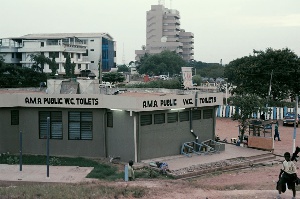Metropolitan, Municipal and District Assemblies (MMDA) in the country have been tasked to construct public toilets and urinals at vantage locations within their jurisdictions to prevent open defecation in the local communities.
The appeal was contained in an eleven point communiqué, issued at the end of the 64th Annual New Year School and Conference, on Thursday in Accra.
The week's conference, which was under the theme: "The Key to the Future Health of Our Nation: Improved Water, Sanitation and Hygiene," was sponsored by scores of institutions including Zoom Alliance, Ghana News Agency, GBC, Daily Graphic and Ghanaian Times.
The communiqué also suggested that scientifically engineered land-fill sites be built in all urban centres, adding that the use of rivers and streams as refuse dumps be outlawed.
It suggested that recycle compost plants be placed in other MMDAs, where the volume of waste was huge.
The communiqué recommended the establishment of sanitation courts at the district level, and also urged the government to introduce a sanitation tax, to be used by the MMDAs for their sanitation activities.
It said among other things, that education on the need for good hygiene should be done in schools, by the media, at work-places, as well as in churches and mosques, in order to make such education effective.
Professor John Gyapong, Pro-Vice-Chancellor of the University of Ghana-Legon, who chaired the closing ceremony of the conference, said while the country had good policies on maintaining a hygienic environment, those policies were not being enforced.
"We do not need new laws. What we need is the implementation of what exists already," he said.
He said to implement the laws, however, would mean taking "bold initiatives" which might not favour everybody.
Prof. Gyapong urged the participants to see themselves as ambassadors of good hygienic practices, and set to working towards a better environment within their communities.
"If we do not take bold initiatives to deal with poor sanitation, we would always come back to the same point, without making any progress," he said.
Prof. Yaw Oheneba-Sakyi, Director of the Institute of Continuing and Distance Education-Legon, said "even if you live in clean surroundings, you should know that an epidemic outbreak in one part of the country could easily affect you, since we share one environment."
He urged all to actively fight against poor sanitary conditions, saying "In the 21st century, progress is not only based on having resources but also, having a healthy work force."
Prof. Oheneba-Sakyi said such a force could be disrupted by hygiene related diseases, if the environment was not kept clean enough.
The conference was attended by 275 participants, consisting of 73 females and 202 males.
Participants came from all over the country and consisted of Teachers, Public Servants, Municipal Chief Executives, District Chief Executives and the Media.
Regional News of Friday, 18 January 2013
Source: GNA

















